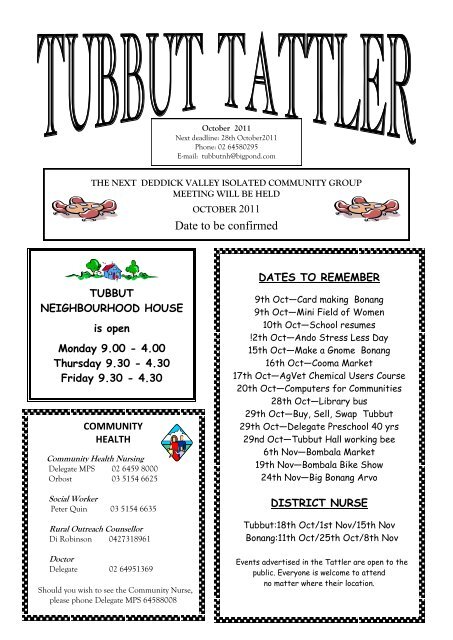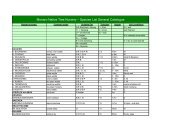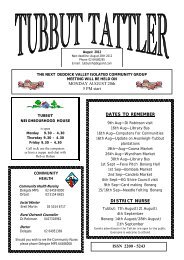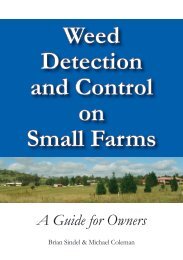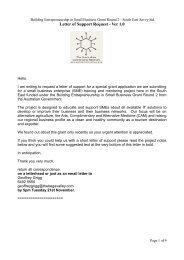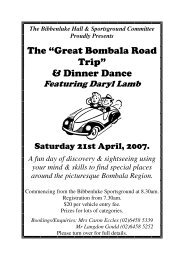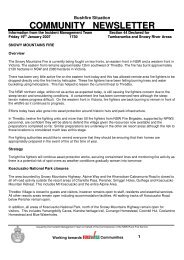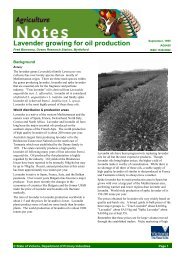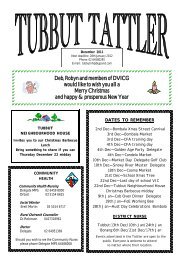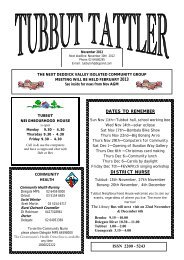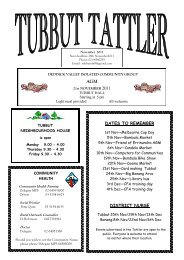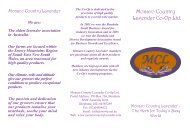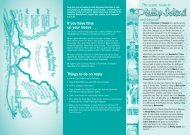Date to be confirmed - Platypus Country
Date to be confirmed - Platypus Country
Date to be confirmed - Platypus Country
You also want an ePaper? Increase the reach of your titles
YUMPU automatically turns print PDFs into web optimized ePapers that Google loves.
Oc<strong>to</strong><strong>be</strong>r 2011<br />
Next deadline: 28th Oc<strong>to</strong><strong>be</strong>r2011<br />
Phone: 02 64580295<br />
E-mail: tubbutnh@bigpond.com<br />
THE NEXT DEDDICK VALLEY ISOLATED COMMUNITY GROUP<br />
MEETING WILL BE HELD<br />
OCTOBER 2011<br />
<strong>Date</strong> <strong>to</strong> <strong>be</strong> <strong>confirmed</strong><br />
TUBBUT<br />
NEIGHBOURHOOD HOUSE<br />
is open<br />
Monday 9.00 - 4.00<br />
Thursday 9.30 - 4.30<br />
Friday 9.30 - 4.30<br />
COMMUNITY<br />
HEALTH<br />
Community Health Nursing<br />
Delegate MPS 02 6459 8000<br />
Orbost 03 5154 6625<br />
Social Worker<br />
Peter Quin 03 5154 6635<br />
Rural Outreach Counsellor<br />
Di Robinson 0427318961<br />
Doc<strong>to</strong>r<br />
Delegate 02 64951369<br />
Should you wish <strong>to</strong> see the Community Nurse,<br />
please phone Delegate MPS 64588008<br />
DATES TO REMEMBER<br />
9th Oct—Card making Bonang<br />
9th Oct—Mini Field of Women<br />
10th Oct—School resumes<br />
!2th Oct—Ando Stress Less Day<br />
15th Oct—Make a Gnome Bonang<br />
16th Oct—Cooma Market<br />
17th Oct—AgVet Chemical Users Course<br />
20th Oct—Computers for Communities<br />
28th Oct—Library bus<br />
29th Oct—Buy, Sell, Swap Tubbut<br />
29th Oct—Delegate Preschool 40 yrs<br />
29nd Oct—Tubbut Hall working <strong>be</strong>e<br />
6th Nov—Bombala Market<br />
19th Nov—Bombala Bike Show<br />
24th Nov—Big Bonang Arvo<br />
DISTRICT NURSE<br />
Tubbut:18th Oct/1st Nov/15th Nov<br />
Bonang:11th Oct/25th Oct/8th Nov<br />
Events advertised in the Tattler are open <strong>to</strong> the<br />
public. Everyone is welcome <strong>to</strong> attend<br />
no matter where their location.
OCTOBER<br />
BIRTHDAYS<br />
Make a Gnome<br />
take it home<br />
Lydia Jamieson<br />
Gary Sandford<br />
Shoshanah Keller<br />
Layla Rose Brooks<br />
Card making<br />
9 th Oc<strong>to</strong><strong>be</strong>r<br />
To <strong>be</strong> held at Bonang Hall<br />
TODDLER GYM<br />
@<br />
BONANG<br />
When: Last Thursday of the Month<br />
Time: 10:30 am <strong>to</strong> 12:00pm<br />
Where: Bonang Hall<br />
10.00am – 3.00pm<br />
The tu<strong>to</strong>r for will <strong>be</strong> Leslie Smith.<br />
Lunch will <strong>be</strong> supplied.<br />
A fee of $5.00 will <strong>be</strong> charged for this<br />
workshop.<br />
Please book in early so we know how many<br />
<strong>to</strong> cater for!<br />
Come and Join in the fun.<br />
Please bring along a piece of fruit <strong>to</strong> share<br />
Jenny Romano needle felting<br />
workshop<br />
Bonang Hall<br />
Saturday Oc<strong>to</strong><strong>be</strong>r 15th<br />
Cost $5<br />
(all materials supplied)<br />
Registration essential<br />
Contact the Neighbourhood House<br />
<strong>to</strong> book your place<br />
PH: 0264580295<br />
E-mail: tubbutnh@bigpond.com<br />
For More info call<br />
Megron on 03 5154 0174<br />
The Tubbut Tattler is produced by the Coordina<strong>to</strong>rs of the Tubbut<br />
Neighbourhood House which is funded by the Vic<strong>to</strong>rian Government.<br />
Material herein is the responsibility of the authors and does not<br />
represent the views of the DVICG or Tubbut Neighbourhood House<br />
unless stated. We welcome material from, and of interest <strong>to</strong>, people in<br />
the border areas of East Gippsland and NSW.
outreach<br />
Orbost<br />
AgVet Chemical Users Course<br />
(Level III)<br />
Previously called the Farm Chemical Users<br />
Course, this course is the industry standard<br />
for training in chemical use, s<strong>to</strong>rage and<br />
handling.<br />
This course provides the required training for<br />
many Industry Quality Assurance Programs<br />
and is necessary <strong>to</strong> apply for the Vic<strong>to</strong>rian<br />
Agricultural Chemical Users Permit (ACUP)<br />
(an ACUP is required for users of Schedule 7 and other<br />
Restricted Chemical Products).<br />
The course covers:<br />
<br />
<br />
<br />
<br />
<br />
<br />
<br />
<br />
<br />
<br />
<br />
Pest ID<br />
Modes of action<br />
La<strong>be</strong>l interpretation<br />
Issues associated with chemical use<br />
Formulation types<br />
Weed and pest control<br />
Application<br />
Animal health<br />
Transport and disposal<br />
Preparation and clean up<br />
Recording and other procedures<br />
Venue: Orbost Education Centre, Ruskin<br />
Street, Orbost<br />
When: Monday, Oct 17 th and Oct 24 th 2011<br />
8.30am – 4.30pm<br />
Course cost: $250 for 2 days or $135 for 1<br />
day refresher (Oct 24 th )<br />
More information?<br />
Enrol now <strong>to</strong> ensure you don’t miss out!<br />
Call Greg on: (03) 5154 1788<br />
Email: gmcnamara@egtafe.vic.edu.au<br />
Thursday 24 th Novem<strong>be</strong>r<br />
Bonang Hall<br />
3-7pm<br />
Make the most of the visit from a range of<br />
health related services<br />
More details in Novem<strong>be</strong>r Tattler<br />
Ando Stress Less Well Being Day<br />
Be pampered and stress less in Ando<br />
Hall, there will <strong>be</strong> a range of stalls,<br />
Beauty, Massage and Bras,<br />
we’ve even got Avon in for the day!<br />
Wednesday 12th Oc<strong>to</strong><strong>be</strong>r<br />
ANDO HALL<br />
Bookings are essential<br />
Contact: Sarah Hart<br />
(Active Communities Coordina<strong>to</strong>r)<br />
at the<br />
Visi<strong>to</strong>r Information centre<br />
(02) 6458 4622<br />
HANDYMAN<br />
Available <strong>to</strong> do odd jobs or anything<br />
you need a hand with.<br />
JUST ASK.....<br />
Phone Nathan<br />
64580312<br />
Library Bus<br />
Just a reminder that the Library Bus<br />
will next <strong>be</strong> visiting the area on<br />
Friday 28th Oc<strong>to</strong><strong>be</strong>r<br />
Bendoc 9.00—9.45<br />
Delegate River 10.45—11.30<br />
Tubbut 1.15—2.15<br />
Bonang 3.00—3.30<br />
Goongerah 4.15—5.00
Computers for Communities 20th Oc<strong>to</strong><strong>be</strong>r<br />
This will <strong>be</strong> held at Tubbut Neighbourhood House<br />
10.00am – 2.00pm<br />
Sharon Buckman will <strong>be</strong> taking this workshop.<br />
Topics <strong>to</strong> <strong>be</strong> covered:<br />
●<br />
●<br />
Pho<strong>to</strong>s<br />
CD Burning<br />
Personal tuition sessions are available on request<br />
Phone the Neighbourhood House for details.<br />
Tea & coffee supplied. Bring your own lunch.<br />
Come and celebrate the 40 years<br />
of the<br />
Delegate and District<br />
Preschool<br />
Saturday 29th Oc<strong>to</strong><strong>be</strong>r<br />
1pm<br />
Delegate <strong>Country</strong> Club<br />
Mad Hatter's Tea Party<br />
for the kids<br />
BUY SELL SWAP<br />
or<br />
GIVEAWAY<br />
Tubbut Neighbourhood House<br />
has some out of date equipment<br />
looking for new homes.<br />
Perhaps you have <strong>to</strong>o!<br />
Bring it along <strong>to</strong> the<br />
Neighbourhood House on the<br />
day.<br />
If you are unable <strong>to</strong> attend on the<br />
day bring your stuff <strong>to</strong> the<br />
Neighbourhood House <strong>be</strong>fore the<br />
29th, making it clear whether you<br />
want <strong>to</strong> sell, swap or give away<br />
The more items the <strong>be</strong>tter; but<br />
we prefer quality junk. We will<br />
make sure lef<strong>to</strong>vers get <strong>to</strong> the<br />
tip or op-shop if no-one wants<br />
them.<br />
Saturday Oc<strong>to</strong><strong>be</strong>r 29th<br />
TUBBUT HALL<br />
10am start<br />
Free BBQ lunch at 12.00<br />
Take a trip down memory lane with a presentation of<br />
pho<strong>to</strong>s from over the years. Meet up with past<br />
students and teachers.<br />
A Celebration CD of pho<strong>to</strong>s and will <strong>be</strong> available.<br />
For more information or <strong>to</strong> contribute pho<strong>to</strong>s or<br />
anecdotes contact the Delegate Preschool on<br />
0264588196<br />
or Michelle Farran on 0264581236<br />
or farran.michelle.l@edumail.vic.gov.au<br />
The Tubbut Hall Committee<br />
is organising a working <strong>be</strong>e and<br />
games for the afternoon<br />
followed by a casserole dinner<br />
so come<br />
for<br />
the day
TUBBUT RESOURCE CENTRE / NEIGHBOURHOOD HOUSE<br />
Phone: 02 64580295<br />
E-mail: tubbutnh@bigpond.com<br />
MONDAY, THURSDAY & FRIDAY<br />
Neighbourhood House News<br />
This month’s Tubbut Tattler is a bit rushed due <strong>to</strong> the Centre’s closing for the school holidays. Nonetheless, Deb<br />
and Robyn have come in <strong>to</strong> the Centre a couple of days over their ‘holidays’ <strong>to</strong> get the Tattler out early in<br />
Oc<strong>to</strong><strong>be</strong>r— the months come around all <strong>to</strong>o quickly and Novem<strong>be</strong>r’s would <strong>be</strong> barking at the door just as we<br />
finished with Oc<strong>to</strong><strong>be</strong>r’s.<br />
Apologies if we have missed some events you are interested in—we didn’t get the information in time.<br />
Community Trailer<br />
The trailer is now registered and available for borrowing at $5 a day.<br />
Swap, sell and give away day<br />
The Neighbourhood House is piggybacking on the Tubbut Hall Committee’s working <strong>be</strong>e and games event with<br />
this one. Please go through your sheds and cupboards with a view <strong>to</strong> bringing your excess, still usable goods <strong>to</strong><br />
Tubbut on Oc<strong>to</strong><strong>be</strong>r 29th. The more stuff, the more fun!<br />
Make a gnome, take it home<br />
Jenny Romano of Metung is coming <strong>to</strong> Bonang on Saturday Oc<strong>to</strong><strong>be</strong>r 15th <strong>to</strong> conduct a workshop in needlefelting—the<br />
project, make a gnome. There is strong interest in this one, so ring up and book a place as soon as<br />
possible.<br />
Our Cappuccinos rock!<br />
The Neighbourhood House has a cappuccino machine and we can guarantee you a good coffee. Come in and<br />
have one! (we also have tea) Deb can teach you how <strong>to</strong> use the machine.<br />
Are you using your pedometers? We have more available at the Tubbut Neighbourhood House <strong>to</strong><br />
help you measure the spring in your step.<br />
Check out our web site at http://platypuscountry.org.au/6928.html—it is still in development but there is a<br />
growing section on local his<strong>to</strong>ry and you can read the Tattler on-line in full colour.<br />
Thank you<br />
A warm thank you goes out <strong>to</strong> the many people involved in making<br />
our decision <strong>to</strong> stay in the community a reality.<br />
Acts of kindness, the <strong>be</strong>auty that surrounds us and the chance<br />
of a <strong>be</strong>tter life kept us here.<br />
Special thanks <strong>to</strong> Alan and Sandy Cameron and David and Julie<br />
Ingram for making us feel welcome at Dellicknora. Also <strong>to</strong> John<br />
and Skye Auer for their generosity since we moved <strong>to</strong> Deddick<br />
Valley.<br />
Anyone who has entered our lives over the past year and<br />
offered assistance, knowledge and friendship—we thank you.<br />
Chris and Kristy Brooks<br />
S<strong>to</strong>p Press<br />
The Deddick Valley Isolated Community Group has<br />
just <strong>be</strong>en notified that we have received a $5000<br />
grant from FaHCSIA <strong>to</strong> support people helping each<br />
other in our community. More details in the next<br />
Tubbut Tattler.<br />
A big happy 1st birthday <strong>to</strong><br />
Layla Rose Brooks.<br />
Born 17th Oc<strong>to</strong><strong>be</strong>r 2011 at<br />
Bombala Hospital.<br />
Love from Mum, Dad and sister<br />
Charlie.<br />
Drop in <strong>to</strong> use the computers,<br />
surf the internet or for a<br />
cuppa and chat with the<br />
coordina<strong>to</strong>rs. Cappuccino now<br />
available!
‘Back <strong>to</strong> the Delegate Preschool’ - Fifty years<br />
1971-2011<br />
On Saturday 29 th of Oc<strong>to</strong><strong>be</strong>r the Delegate Community will <strong>be</strong> celebrating the fortieth<br />
anniversary of the Delegate and District Preschool with a Mad Hatters Tea party at the<br />
Delegate <strong>Country</strong> Club from 1:00 pm.<br />
In 1970, Vicki Thompson first mooted the idea for a preschool at Delegate and this quickly<br />
gained the support of the community. Preschool sessions <strong>be</strong>gan in the CWA rooms<br />
under the supervision of the first direc<strong>to</strong>r, Mrs Valerie Auer, in 1971. After several weeks it<br />
was moved <strong>to</strong> St Phillips Church of England Hall.<br />
In 1976 the Woodglen School building came up for auction. Then <strong>be</strong>gan months of<br />
haggling with various government departments until finally a grant was obtained enabling<br />
the old school building <strong>to</strong> <strong>be</strong> moved and renovated for the preschool in May 1978. The<br />
success of this venture was due <strong>to</strong> the unity and effort of the greater Delegate community,<br />
with individuals and businesses pitching in with donations and voluntary labour.<br />
Mrs Auer continued as Direc<strong>to</strong>r for twenty two years until her retirement in 1992. The<br />
position was then taken up by Di Whit<strong>to</strong>ck in 1993. Di held the position throughout the<br />
Nineties. She was followed by Katrina Allen, Kathy Stres, Maggie Janstad and our current<br />
Direc<strong>to</strong>r Tonelle Lewis.<br />
The Delegate District Preschool continues <strong>to</strong> provide excellent early childhood education<br />
offering both Preschool and Long Day-care services and a Playgroup for the children of<br />
the wider Delegate Community.<br />
So what‘s happening if you come along Saturday? You are invited <strong>to</strong> dress-up for A Mad<br />
Hatters afternoon tea <strong>to</strong> raise funds for the Heart Kids Foundation, a presentation of<br />
memorabilia and old pho<strong>to</strong>s, games, songs and competitions for the <strong>be</strong>st hats and<br />
costumes, with the current preschoolers.<br />
Michelle Farran, President
The Aussie Dunny<br />
(Found on the internet Author unknown)<br />
They were funny looking buildings, that were once a way of life,<br />
If you couldn't sprint the distance, then you really were in strife.<br />
They were nailed, they were wired, but were mostly falling down,<br />
There was one in every yard, in every house, in every <strong>to</strong>wn.<br />
They were given many names, some were even funny,<br />
But <strong>to</strong> most of us, we knew them as the outhouse or the dunny.<br />
I've seen some of them all gussied up, with painted doors and all,<br />
But it really made no difference, they were just a port of call.<br />
Now my old man would take a <strong>be</strong>t, he'd lay an even pound,<br />
That you wouldn't make the dunny with them turkeys hangin' round.<br />
They had so many uses, these buildings out the back,<br />
You could even hide from mother, so you wouldn't get the strap.<br />
That's why we had good cricketers, never mind the bumps,<br />
We used the pathway for the wicket and the dunny door for stumps.<br />
Now my old man would sit for hours, the smell would rot your socks,<br />
He read the daily back <strong>to</strong> front in that good old thunderbox.<br />
And if by chance that nature called sometime through the night,<br />
You always sent the dog in first, for there was no flamin' light.<br />
And the dunny seemed <strong>to</strong> <strong>be</strong> the place where crawlies liked <strong>to</strong> hide,<br />
But never ever showed themselves until you sat inside.<br />
There was no such thing as Sor<strong>be</strong>nt, no tissues there at all,<br />
Just squares of well read newspaper, a hangin' on the wall.<br />
If you had some friendly neighbours, as neighbours sometimes are,<br />
You could sit and chat <strong>to</strong> them, if you left the door ajar.<br />
When suddenly you got the urge, and down the track you fled,<br />
Then of course the magpies were there <strong>to</strong> peck you on your head.<br />
Then the time there was a wet, the rain it never s<strong>to</strong>pped,<br />
If you had an urgent call, you ran <strong>be</strong>tween the drops.<br />
The dunny man came once a week, <strong>to</strong> these buildings out the back,<br />
And he would leave an extra can, if you left for him a zac.<br />
For those of you who've no idea what I mean by a zac,<br />
Then you're <strong>to</strong>o young <strong>to</strong> have ever had, a dunny out the back.<br />
(Zac was slang for a sixpence coin <strong>be</strong>fore decimal currency came in<strong>to</strong> Australia in 1966)
Breast Cancer support on display<br />
More than a hundred Pink Lady silhouettes will <strong>be</strong> on display at McKillops Bridge on Sunday 9 th<br />
Oc<strong>to</strong><strong>be</strong>r 2011 in a meaningful show of support for women and families affected by breast cancer.<br />
Every day 38 Australian women will <strong>be</strong> <strong>to</strong>ld they have breast cancer and seven will lose their lives <strong>to</strong> the disease.<br />
Local organiser Rikki Jones explains; ‘Each time a woman hears she has breast cancer, those around her in the<br />
community are also affected. Support for women and families affected by breast cancer is an important issue in our<br />
local community.’<br />
Breast Cancer Network Australia‘s (BCNA) Mini-Field of Women events provide an opportunity for the public <strong>to</strong> pay<br />
tribute <strong>to</strong> all those affected by breast cancer.<br />
Founder and CEO of BCNA, Lyn Swinburne, herself a breast cancer survivor, says the event is a powerful reminder<br />
that you are not alone on your breast cancer journey; ‘This Oc<strong>to</strong><strong>be</strong>r, around 300 Mini-Field of Women events are<br />
<strong>be</strong>ing held in local communities around Australia. These events are a great way <strong>to</strong> link those people affected by<br />
breast cancer with their local community. We hope people participating will find the event meaningful and enjoy it as<br />
a celebration of life.’<br />
Local organiser Rikki said: ‗Although breast cancer care and knowledge has come a long way in the past, there are<br />
still women <strong>be</strong>ing diagnosed every single day who need <strong>to</strong> <strong>be</strong> provided with our help and support. Breast cancer is<br />
an issue close <strong>to</strong> many women and affects our community.’<br />
The community is invited <strong>to</strong> participate in this local event and <strong>to</strong> take the opportunity <strong>to</strong> leave a personal message of<br />
support.<br />
Background<br />
BCNA‘s Mini-Field of Women events in local communities follow on from the highly successful Field of Women LIVE<br />
events held in 2005 (MCG), 2007 (Telstra Stadium, Sydney), and 2010 (MCG). At the 2010 event, the most recent,<br />
14,000 people formed the Pink Lady silhouette, bringing the national breast cancer statistics <strong>to</strong> life in a sparkling<br />
display of strength, support and camaraderie. They are also a way <strong>to</strong> let people know about support resources such<br />
as BCNA‘s My Journey Kit, a free resource for women diagnosed with breast cancer.<br />
About Breast Cancer Network Australia<br />
Breast Cancer Network Australia (BCNA) is the national voice of all Australians personally affected by breast cancer,<br />
representing more than 300 Mem<strong>be</strong>r Groups and over 60,000 individuals. We are represented by the Pink Lady<br />
silhouette, which reflects our key focus – women diagnosed with breast cancer. BCNA‘s mission is <strong>to</strong> inform,<br />
empower, represent and link <strong>to</strong>gether Australians affected by breast cancer.<br />
The diagnosed women - who are our mem<strong>be</strong>rs - are the human faces and s<strong>to</strong>ries <strong>be</strong>hind breast cancer. BCNA works<br />
<strong>to</strong> ensure that women diagnosed with breast cancer, and their families, receive the very <strong>be</strong>st information, treatment,<br />
care and support possible – no matter who they are or where they live.<br />
Support following early breast cancer diagnosis<br />
If you or someone you love has <strong>be</strong>en recently diagnosed with breast cancer, please call Breast Cancer Network<br />
Australia on 1 800 500 258 or visit www.bcna.org.au <strong>to</strong> obtain a free My Journey Kit.<br />
Bring a picnic lunch <strong>to</strong>…..<br />
WHAT:<br />
Mini-Field of Women Event<br />
Supporting Breast Cancer Network Australia (BCNA)<br />
WHERE:<br />
McKillops Bridge<br />
WHEN: Sunday 9 th Oc<strong>to</strong><strong>be</strong>r 2011<br />
1.30 pm
Remem<strong>be</strong>ring our past—Mary Young<br />
I interviewed Janet Cameron about her grandmother for the<br />
Local Rag 66 (Oc<strong>to</strong><strong>be</strong>r 1984). Janet and Jim Cameron were<br />
my neighbours until they sold their place <strong>to</strong> Ro<strong>be</strong>rt Belcher in<br />
the late 1980s. I still miss them.<br />
Deb<br />
Mary, the oldest daughter of the Young family,<br />
was born in 1886 in Scotland. Her father was a<br />
coal-miner and, for some time, her mother ran a<br />
small general s<strong>to</strong>re in the village where they lived.<br />
One of the favourite entertainments of the children<br />
in the village was ice-skating in winter. Mary did<br />
not like school so left early <strong>to</strong> go ‗in<strong>to</strong> service‘. Her<br />
jobs were generally on dairy farms and included<br />
the tasks of milking cows, making butter and<br />
cheese and so on. She lived in, collecting her pay<br />
every six months, then visiting home. For her six<br />
months long labour she would take home<br />
seventeen shillings and sixpence!<br />
At one of the larger farms she worked on, Mary<br />
met George Buchanan who <strong>be</strong>came her husband.<br />
For several years they continued at this sort of<br />
work, living in the small cottages provided for<br />
family men on the job. During this time they had<br />
three children: Agnes, Alec and Helen. Mary‘s<br />
older brother Alec had gone <strong>to</strong> Australia <strong>to</strong> try his<br />
luck. He liked what he saw so invited his brother<br />
John and family and Mary and her family <strong>to</strong> come<br />
and settle with him on land he had purchased at<br />
Kyabram.<br />
Although Mary was well in<strong>to</strong> her fourth pregnancy<br />
at the time, and although World War 1 had just<br />
blown up, the family set sail. Mary was sick for the<br />
entire six weeks of the voyage until they landed in<br />
Adelaide. Needless <strong>to</strong> say, she was much happier<br />
making the last leg of the journey <strong>to</strong> Melbourne on<br />
land. George was born in January at Kyabram,<br />
four weeks after their arrival.<br />
Once again Mary and George were living and<br />
working on a dairy farm although they must have<br />
found life very different ‗down under‘ <strong>to</strong> those<br />
Scottish farms where cattle had <strong>to</strong> <strong>be</strong> hand fed<br />
and kept under cover for winter.<br />
Tragically, George died a young man.<br />
Unfortunately he was not able <strong>to</strong> leave his family<br />
well-provided for. Those were hard and lonely<br />
times for Mary; she would have liked <strong>to</strong> have<br />
returned <strong>to</strong> Scotland <strong>to</strong> family and friends but<br />
without resources, had <strong>to</strong> stay <strong>to</strong> keep her family<br />
fed, clothed and sheltered.<br />
Fortune changed, however, when she met and<br />
married Charlie Miles. He liked the country in East<br />
Gippsland so they moved over <strong>to</strong> Swan Reach,<br />
where they ran a dairy farm long enough for all the<br />
Buchanan children <strong>to</strong> finish school there.<br />
They sold the farm and moved east <strong>to</strong> Orbost<br />
where Charlie ran a saddlery and boot repair<br />
business. Their house, which has since burned<br />
down, was in New<strong>to</strong>wn on the north-west side of<br />
Orbost.<br />
Helen, or Nell as she was called, had married Cecil<br />
Haylock from Bairnsdale. They moved next door <strong>to</strong><br />
Mary and Charlie in Orbost. There were a few<br />
palings missing in the side fence so a little girl<br />
called Janet could slip through in<strong>to</strong> her<br />
grandmother‘s place every chance she got.<br />
Mary‘s oldest child, Agnes, married Ellis, son of<br />
Jack Light of Orbost. At one stage, Jack ran the<br />
Granite Creek Hotel, probably a full day‘s ride from<br />
the Danebo Hotel at Martins Creek. At that time,<br />
the old Bonang Highway <strong>to</strong>ok the ridge route, west<br />
of the current road. Like so many other his<strong>to</strong>ric<br />
buildings in East Gippsland, the hotel was taken by<br />
fire many years ago.<br />
During the Depression in the 1930s, Charlie was<br />
working for the <strong>Country</strong> Roads Board. The job<br />
brought him <strong>to</strong> the Bonang area and here he fell in<br />
love with a piece of land at Delegate River. Not one<br />
for mucking around, he sold the Orbost house and<br />
bought, from the Hutchinsons, eleven acres on the<br />
south-eastern corner where Kirkenong Road meets<br />
the Bonang Road at its southern end. At that time it<br />
had a good house with a shingle roof and a nice<br />
garden, with Spring Creek crossing the property<br />
providing a perfect site for a hydraulic ram.<br />
Our Janet moved up with Mary and Charlie, Mary‘s<br />
oldest son Alec and youngest son Peter. Grandma<br />
reckoned that Janet would fret if she stayed in<br />
Orbost without her grandmother on the other side<br />
of the fence. Soon after, Janet‘s younger siblings<br />
moved up <strong>to</strong>o. Nell had moved <strong>to</strong> Melbourne and<br />
Mary thought that the city was no place for young<br />
children.<br />
Charlie was working on the CRB with Archie Camm<br />
of Bonang. They looked after the stretch from the<br />
border <strong>to</strong> Bonang. It was pick and shovel,<br />
wheelbarrow and cart work in those days.<br />
Janet must have <strong>be</strong>en like her grandmother<br />
<strong>be</strong>cause she had started school at the age of four<br />
in Orbost and hated it. (In telling me her s<strong>to</strong>ry,<br />
Janet said that she was probably just <strong>to</strong>o young.)<br />
Practising for air-raids, with the siren blaring and<br />
the children walking in single file <strong>to</strong> the shelter,<br />
would have brought World War Two frighteningly<br />
close <strong>to</strong> those Orbost children.<br />
School at Lower Delegate River was a different<br />
s<strong>to</strong>ry. Imagine Delegate River with two schools!<br />
The one Janet attended was at the old hall on the
Bonang Road; the other was on the Kirkenong<br />
Road. Each school had about seventeen pupils and<br />
Janet‘s classmates were:<br />
Kevin, Bonny and Beryl Ingram<br />
David Legge<br />
Charlie Allen<br />
Geoff Foley<br />
John, Mervyn and Phyllis Crawford<br />
Baker children<br />
Frank and Ted Schultz (Mary Mead‘s children)<br />
The Schultz family ran a sawmill in a gully <strong>to</strong> the<br />
right of the Bonang Road after passing Spring Creek<br />
Gap heading <strong>to</strong>wards Delegate. Janet used <strong>to</strong> watch<br />
the team of six bullocks pulling the logs down the<br />
road past their place <strong>to</strong> <strong>be</strong> sawn up at the mill.<br />
The Miles family acquired the eighty-four acre block<br />
across the road but the family decided <strong>to</strong> stay where<br />
they were as by now their house was a fine one with<br />
eight rooms and a hut for Charlie <strong>to</strong> do his<br />
leatherwork in.<br />
The Miles family was happy at Delegate River. Janet<br />
remem<strong>be</strong>rs the community there as friendly and<br />
lively. Neighbours stuck <strong>to</strong>gether and helped each<br />
other out. The Miles only had use of a vehicle when<br />
Alec, Mary‘s oldest son, who lived with her all her<br />
life except during World War Two, was there <strong>to</strong> drive<br />
it. Otherwise they relied upon neighbours <strong>to</strong> provide<br />
lifts or pick up provisions for them in Delegate.<br />
Mary worked hard at Delegate River, as she had<br />
done all her life. When she wasn‘t tending <strong>to</strong> the<br />
needs of the cows, chooks and geese, she was<br />
grubbing out scrub. Of course, there was always the<br />
cooking and housekeeping.<br />
In summer they made butter and in winter they<br />
made ice-cream using snow and ice collected on<br />
frosty mornings for refrigeration. It worked <strong>be</strong>st with<br />
new milk and several hands <strong>to</strong> turn the handle<br />
<strong>be</strong>cause it always <strong>to</strong>ok over an hour. A sweet<br />
custard was placed in the inner steel container and<br />
ice or snow packed <strong>be</strong>tween this and the wooden<br />
barrel which formed the outside. Ice-cream in<br />
summer is a modern luxury.<br />
A family makes ice-cream—image from http://<br />
inven<strong>to</strong>rs.about.com/od/foodrelatedinventions/ss/<br />
ice_cream_2.htm<br />
Charlie had a saddle and boot repair business in<br />
Delegate where Delcott Mo<strong>to</strong>rs is now. Business<br />
was good when there was a cattle sale in <strong>to</strong>wn and<br />
the drovers came in on their horses. It got busy at<br />
home <strong>to</strong>o, as Mary used <strong>to</strong> provide <strong>be</strong>d and<br />
breakfast for the six <strong>to</strong> eight drovers taking cattle<br />
home after the sale. It <strong>to</strong>ok a day <strong>to</strong> get from<br />
Delegate <strong>to</strong> the River but Mary generally had<br />
warning of their arrival. The pack-horse,<br />
Whalebone, knew the way and the s<strong>to</strong>pping places.<br />
Loaded <strong>to</strong> the hilt, he would arrive a couple of<br />
hours ahead of the mob.<br />
Over the years, the cost of s<strong>to</strong>pping at Mary‘s went<br />
from five shillings a head <strong>to</strong> fifteen shillings. Jack<br />
Parkes, with sons Jim, Gordon and Laurie, were<br />
generally among the drovers. From Delegate River<br />
they had another five days on the road <strong>to</strong> Orbost.<br />
During the war, most of life‘s necessities could <strong>be</strong><br />
acquired only by producing coupons. Many families<br />
found it difficult <strong>to</strong> make the week‘s allowance (for<br />
instance, 250 g of butter/person/week) last. In Mary<br />
Miles‘ house, they never ran out. The rules were<br />
strict: if you had peanut butter on your bread, you<br />
didn‘t have butter <strong>to</strong>o.<br />
A pot of tea stretched a long way. But this was<br />
Scotch thrift, not meanness, as many neighbours<br />
discovered when they ran out. Mary always had<br />
some spare coupons for emergencies.<br />
Soda bread—bicarb<br />
of soda is used<br />
instead of yeast as<br />
rising agent— quick<br />
<strong>to</strong> prepare and able<br />
<strong>to</strong> <strong>be</strong> cooked in a<br />
pan on the fire or in<br />
a camp oven. A<br />
hardy standby of the<br />
Depression country<br />
kitchen.<br />
http://www.s<strong>to</strong>ckfood.cz/<br />
results.asp?<br />
txtkeys=Loaf%20of%<br />
20bread<br />
Charlie <strong>be</strong>came ill <strong>to</strong>wards the end of his life and<br />
moved <strong>to</strong> Melbourne where he stayed with the<br />
children of his first marriage. Mary stayed on at<br />
Delegate River with Alec but eventually ill-health<br />
meant that she <strong>to</strong>o had <strong>to</strong> leave her home. She<br />
died in Sale hospital in the late 1960s.<br />
Mary‘s life was not extraordinary and she seems <strong>to</strong><br />
have <strong>be</strong>en bypassed by the local his<strong>to</strong>rians of the<br />
region. She was a woman of her times; she loved<br />
this area, she worked hard, she raised six children<br />
and contributed <strong>to</strong> the lives of many others. But I‘ve<br />
liked the sound of her ever since I first heard Janet<br />
talk about her. Whenever I come in<strong>to</strong> Delegate<br />
River, I imagine her at work in some corner of the<br />
house or paddock. Her s<strong>to</strong>ry reminds us of the role<br />
women played in creating the character of this<br />
area.
Remem<strong>be</strong>ring our past— the Simpson family<br />
Cabanandra is half way <strong>be</strong>tween Tubbut and Bonang<br />
and one of the earliest parts of the district <strong>to</strong> <strong>be</strong> settled<br />
by farmers. Cabanandra is situated in the Parish of<br />
Bonang while Dellicknora is in the Parish of<br />
Cabanandra, just <strong>to</strong> confuse things.<br />
Cabanandra has a long Aboriginal his<strong>to</strong>ry evidenced in<br />
the many s<strong>to</strong>ne <strong>to</strong>ols that have <strong>be</strong>en found around the<br />
place.<br />
Charlie and Joyce Simpson owned ’Wallaby Rocks’<br />
when I first moved <strong>to</strong> Cabanandra in 1972. Somehow we<br />
missed interviewing him for the Local Rag; perhaps that<br />
was <strong>be</strong>cause the Simpsons moved <strong>to</strong> Delegate in 1974.<br />
When Charlie died in 1983, the Rag published an article<br />
from Mary Gil<strong>be</strong>rt’s collection, lent <strong>to</strong> The Rag by Clarice<br />
Ingram. The article was prepared by Ms Ward and<br />
Mossfield, born Simpson. I have augmented it with dates<br />
and any other info I could find.<br />
Deb<br />
A Simpson family lived at Bendoc. Mr Charles Simpson<br />
married a widow from England who had three children.<br />
They had three sons, Charles, Arthur and Fred and three<br />
daughters: Kate (Mrs Clarke, wife of Constable Clarke of<br />
Orbost and Bendoc), Annie (Wife of Bill Armstrong,<br />
teacher at Bonang) and Emma, (Mrs Bob Marriott of<br />
Bonang). Grandma Simpson lived until she was 102<br />
years old.<br />
The Simpson family <strong>to</strong>ok up Cabanandra Station. This<br />
Charles Junior (born in Cabanandra in 1855, married<br />
Allison Dickson in 1916) had a family of four girls: Maude<br />
(Mrs R.H. Ingram), Nellie (Mrs Koon), Christine (Mrs<br />
Ward) and Eileen (Mrs Mossfield). Their dad was a north<br />
riding shire councillor.<br />
When the girls first started school, their parents drove<br />
them in the buggy down <strong>to</strong> Bonang where they stayed<br />
during the week with Mrs James Marriott of Rose<br />
Cottage. The school was a tiny wooden building. Later,<br />
there was a school built at Honeysuckle Range, about<br />
four miles from Cabanandra, and not flat miles either—<br />
up hill and down dale with dingoes howling.<br />
One morning the noise was so loud and the children<br />
were so frightened that they <strong>to</strong>re off home. But it was the<br />
Federal Mine working. They ate the fruit of the bush—<br />
wild cherry, prickly ground <strong>be</strong>rries, like goose<strong>be</strong>rries,<br />
geebung and what they called honey flowers. They<br />
hated their boots and would leave them under a log until<br />
they returned. At one time there were 32 at the school<br />
including Richardsons, Hungerfords, Mannings, Marriotts<br />
and three Simpson families—all settlers‘ children.<br />
Mr Her<strong>be</strong>rt Bloomfield Hungerford had a s<strong>to</strong>re <strong>be</strong>low the<br />
Honeysuckle School. At lunchtime the children would<br />
take their rabbit skins <strong>to</strong> barter for lollies and honey<br />
jumble biscuits. Rabbit drives on horseback were very<br />
popular on weekends. The rabbits were not fully<br />
entrenched in burrows then.<br />
A highlight each year was the school picnic (held in the<br />
old campdraft paddock which then <strong>be</strong>longed <strong>to</strong> the<br />
Simpsons). At night the whole district from near and far<br />
would go down <strong>to</strong> Grandma Simpson‘s. Her dining room<br />
had a wonderful dancing floor. The music was an<br />
accordion and Granny used <strong>to</strong> come prancing in and do<br />
the sword dance over crossed brooms. The dance<br />
program included al<strong>be</strong>rts, lancers, quadrilles, polka<br />
mazurkas, heel and <strong>to</strong>e polkas, varsivienna and<br />
highland schottische. The kitchen had a huge<br />
fireplace with a big built in oven at the side for<br />
baking bread.<br />
The other cooking was done in camp ovens and<br />
good cooking it was <strong>to</strong>o. Down the centre was a<br />
long table loaded with supper—mostly pork pies<br />
made by Granny: tarts, scones, cakes,<br />
sandwiches. They danced till daylight.<br />
Later a very big Carter family moved in and<br />
another school was started at S<strong>to</strong>ny Creek. The<br />
teacher was an old man, Mr Kruckow, whom they<br />
all loved. He wrote a poem for them when he left.<br />
Farewell little maids of the mountains,<br />
The frost, the snow and the dew,<br />
Farewell little maids of the mountains,<br />
My days have <strong>be</strong>en pleasant with you.<br />
And when you sing by the ingle,<br />
At eve, in the days <strong>to</strong> come,<br />
Give a kindly thought for the poor old man<br />
Who sang with you ‗Home Sweet Home‘.<br />
For he loved you all and wished you well,<br />
So dear little maids, farewell, farewell.<br />
The Simpsons milked about 30 cows. Mrs Simpson<br />
sold butter for a shilling a pound. They always had<br />
about 70 turkeys.<br />
The roof of the kitchen was unlined. There hung<br />
the homemade hams, bacon, sausages and black<br />
puddings. On the end of the veranda was a window<br />
out of the kitchen. Below it was a big wooden cask<br />
for water for household use. It was one of the<br />
children‘s jobs <strong>to</strong> put on a wooden shoulder yoke,<br />
go down the steps and down <strong>to</strong> the Cabanandra<br />
(Jingallala) River and bring back buckets of water<br />
until the cask was full. The wash-house was down<br />
near the river with a big iron boiler for washing<br />
clothes.<br />
An image from Queensland—washing in the copper.<br />
http://trove.nla.gov.au/work/153912072<br />
Charles Simpson and his wife moved down <strong>to</strong><br />
Granite Creek, eighteen miles from Orbost, where<br />
they bought the East Gippsland Hotel from Lights,<br />
who had held it as the Lighthouse Hotel. Cattlemen<br />
and travellers stayed overnight and the mail came<br />
through three times a week. Mr and Mrs Simpson<br />
were not there for long, for Mrs Simpson died.
Race day at Cabanandra in the 1930s<br />
Cabanandra Picnic Sports 1.1.1939<br />
‘The Advertiser’ I have read and now I do desire<br />
To write a verse on what they said—or throw it in the<br />
fire.<br />
On second thoughts that will not do, I’ll stand all<br />
condemnation<br />
And send this stuff along for you, its not for publication.<br />
The Cabanandra Sports I see, was quite a ‘swell turnout’.<br />
You didn’t go! You’re telling me? I’m guessing there’s no<br />
doubt<br />
The scri<strong>be</strong> who executed this report had Webster’s by his<br />
hand,<br />
The words he used, he didn’t ought, how could ‘we’<br />
understand?<br />
I wasn’t there you’re well aware, but let us all suppose<br />
The poem emerged from this affair and this is how it<br />
goes.<br />
The cars rolled up from near and far, <strong>to</strong>o far for some I<br />
fear.<br />
They fought their way up <strong>to</strong> the bar and drank Bill<br />
Mustard’s <strong>be</strong>er.<br />
The day was fine and very hot, but all enjoyed the fun.<br />
Some talked a lot of flaming rot and swanked how they<br />
could run.<br />
Old Arthur Simpson, he was there, and did a lot of<br />
magging<br />
‘Bout what he did when just a kid, I’m sure he wasn’t<br />
bragging.<br />
Don’t tell us Stanley Reed’s a siss, he’s game as old Ned<br />
Kelly,<br />
The throng was thrilled in gleeful bliss as the steer flopped<br />
on his <strong>be</strong>lly.<br />
Stan threw up his hands and shouted, “Strike me pink!<br />
I realise I’ve won first prize, come Don and have a drink.”<br />
The racey men were there of course and backed the steeds<br />
‘both ways’.<br />
They plunged ‘two bob’ on every horse and won on Don<br />
McKay’s.<br />
Don’s ‘Scotty’ is a speedy nag, his name would suit a pup.<br />
Its rumoured in the local rag, “he’ll win a Melbourne Cup”.<br />
The Windle chap can swing a blade, he started this year well.<br />
But ‘Tom’ showed him that he was made of stuff as <strong>to</strong>ugh as<br />
hell.<br />
These lads have trained with such a will, there’s not a tree<br />
left standing<br />
From Hayden’s Bog and Little Bill, a plane could make a<br />
landing.<br />
Suppose you think I’m silly, well possibly you’re right.<br />
But its mainly due <strong>to</strong> you and yours that I’m in such a plight.<br />
Written by the Foley brothers, Ned and Pat, 30.1.1939<br />
The Cabanandra Picnic Races were held on the site where the<br />
Cabanadra Campdraft used <strong>to</strong> <strong>be</strong> when owned by Jim &<br />
Janet Cameron; it is now owned by Ro<strong>be</strong>rt Belcher.<br />
Thanks <strong>to</strong> Sandy Cameron for the pho<strong>to</strong> and the poem.
My Year in Tubbut—Glen Marshall interview<br />
Last month, the Tattler published a letter written by former<br />
teacher Glen Marshall <strong>to</strong> the Tubbut School teacher in the<br />
1990s. Since he put his phone num<strong>be</strong>r on the letter, I rang and<br />
persuaded Glen <strong>to</strong> succumb <strong>to</strong> a telephone interview on August<br />
24 th 2011. This is an edited telling of Glen’s side of the<br />
conversation, with footnotes provided by Sandy Cameron, who<br />
kindly read a draft of my write-up. The pho<strong>to</strong>graphs are also<br />
courtesy of Sandy.<br />
1950 – that was the year I went <strong>to</strong> Tubbut. It was my first year<br />
out. I had graduated in Agricultural Science and had secured a<br />
job with CSIRO in plant pathology. But I had a hankering <strong>to</strong><br />
try teaching, so I thought the job over, went <strong>to</strong> Can<strong>be</strong>rra and<br />
cancelled that appointment and applied for a teaching position.<br />
and found that they were rabbits - there must have <strong>be</strong>en a<br />
hundred of them. I thought <strong>to</strong> myself, well that means the<br />
dogs will get a good feed, but no. They were for us. We lived<br />
on rabbits, meal after meal after meal. (2)<br />
The place was terribly friendly but it was as backwards as<br />
you could possibly imagine it. In the wintertime, Pardy – he<br />
was the grandfather – I was staying with Clem Ingram, he<br />
was a councilor in Orbost Shire Council. There were two<br />
children, Sandra and Malcolm, who were going <strong>to</strong> the<br />
school. I got on very well with Clem, they were very, very<br />
friendly people and I absolutely enjoyed their company. It<br />
was quite strange for me. I do like an isolated existence, but<br />
it was a training as far as I was concerned.<br />
After I graduated as a teacher – in primary education – I<br />
applied for a remote school. As for preparation for the position,<br />
the Department gave me practically no direct support. I was<br />
left entirely on my own. When I <strong>to</strong>ok over this one teacher<br />
school, something amusing happened. Around Easter time<br />
when we had our first one week break, I was raising my hands,<br />
asking, ‘What do we do next?’ That’s how much preparation I<br />
had. In those days, there were inspec<strong>to</strong>rs of schools. They were<br />
phased out and later I <strong>be</strong>came the equivalent, then called Area<br />
Education Officers.<br />
The school<br />
The inspec<strong>to</strong>r came <strong>to</strong> inspect the school on the last school day<br />
of the year. Could you imagine anything worse? I never had<br />
sight or sound of him the whole time I was in Tubbut.<br />
The old Tubbut school<br />
There was no electricity at the school, so I could only work<br />
with great difficulty. I couldn’t use any aids such as the old<br />
slide projec<strong>to</strong>r.<br />
Emptying the <strong>to</strong>ilet was one of the jobs I had <strong>to</strong> do. I also had<br />
<strong>to</strong> sweep the school out, I was paid an allowance for that.<br />
Glen, with Meg, who appears later in this s<strong>to</strong>ry<br />
Arrival<br />
I remem<strong>be</strong>r very clearly my arrival at the school. It was on the<br />
Bonang Highway, I arrived at Bonang in a bus, at the s<strong>to</strong>re<br />
there, and I still had another 30 miles <strong>to</strong> go (1). I went in<strong>to</strong> the<br />
s<strong>to</strong>re and asked if there was anyone there <strong>to</strong> meet me. ‘No,’<br />
they said, ‘they’re away. The mail driver will take you <strong>to</strong> the<br />
school and drop you there. There’s no-one at the house, they’ll<br />
<strong>be</strong> back at the end of the week.’<br />
I arrived at the house where I was going <strong>to</strong> <strong>be</strong> boarding. There<br />
were only seven families in the entire area and I was boarded<br />
with one of them. There was a note <strong>to</strong> say my <strong>be</strong>d was on the<br />
veranda, cordoned off a bit. It was a rough type of <strong>be</strong>d, but it<br />
was satisfac<strong>to</strong>ry. I went outside and saw that the clothesline<br />
was heavily propped and there were all these carcasses hanging<br />
off the it, with the skins taken off them+. I went and had a look<br />
The children were interested in learning, but they were very<br />
shy. I’ll tell you a little s<strong>to</strong>ry about that. We went for a walk<br />
along the road and a mo<strong>to</strong>rist passed. The road didn’t go<br />
anywhere at that stage, after the bridge went, the road<br />
actually ended at the Snowy River. The driver saw the<br />
children with their young teacher, so he pulled up <strong>to</strong> have a<br />
yarn. We talked for a while and the children were very quiet,<br />
they just listened <strong>to</strong> what we were saying. After he left, I<br />
realized they were <strong>be</strong>ing bitten by ants, they were standing in<br />
a <strong>be</strong>d of ants, but there was no hue or cry from any of them,<br />
they were very shy.<br />
I was with the students all the time. It used <strong>to</strong> <strong>be</strong> funny.<br />
Malcolm used <strong>to</strong> amuse me quite a bit. He’d <strong>be</strong> a long way<br />
away – he was a little quiet boy but he had a loud voice – and<br />
every now and again he’d want <strong>to</strong> attract my attention and he<br />
would call out ‘Sir!’ at the <strong>to</strong>p of his voice and he would do<br />
it anywhere – in the middle of practically nowhere. He’d<br />
never say ‘Mr Marshall,’ he’d just call out ‘sir’!<br />
I remem<strong>be</strong>r them very well. I remem<strong>be</strong>r all the children.<br />
I always prepared very well. It was always difficult <strong>be</strong>cause<br />
Clem’s place had no electricity. There was a genera<strong>to</strong>r – it
was only a ten bob thing and it didn’t generate very much. I used<br />
<strong>to</strong> prepare all my lessons under lamplight but I would always<br />
have everything prepared and I’ve stuck <strong>to</strong> that right <strong>to</strong> my last<br />
teaching days. My typical day went off quite well but the<br />
preparation was a strain <strong>be</strong>cause of the circumstances. I gave<br />
them very little homework, <strong>be</strong>cause it wasn’t done. I relied<br />
mainly on things they could do verbally. When the inspec<strong>to</strong>r<br />
came we had a little bit of singing and he wrote in the report that<br />
there was very tuneful singing from teacher and students.<br />
I opened up the school and we had a school <strong>be</strong>ll – just a hand<strong>be</strong>ll<br />
– and I always did what I considered gave them the sense of<br />
<strong>be</strong>ing in a community. I rang the <strong>be</strong>ll for the start of school and<br />
at recess times and things like that. It gave them a sense of <strong>be</strong>ing<br />
in an institution of some description even though we had every<br />
grade from grade one <strong>to</strong> grade nine. We had <strong>to</strong> <strong>be</strong>cause there<br />
was no other place <strong>to</strong> send them.<br />
There was no electricity at the school, so I could only work with<br />
great difficulty. I couldn’t use any aids such as the old slide<br />
projec<strong>to</strong>r.<br />
Window row: Colin Bryant & Malcolm Ingram in front; Meg<br />
Bryant and Greta Commons <strong>be</strong>hind them.<br />
We had a whopping great big fireplace and I had <strong>to</strong> chop the<br />
wood for the fire <strong>be</strong>cause we had snow there in winter and it was<br />
very cold but we had the place warm. There’s a funny s<strong>to</strong>ry about<br />
that fireplace. We had Santa Claus for Christmas and [he] was a<br />
fairly tall fellow so we had <strong>to</strong> secrete him somewhere out of sight<br />
while we had the first half of Christmas activities so we put him n<br />
the fireplace with a curtain over the entrance <strong>to</strong> it. Santa Claus<br />
<strong>to</strong>ok a bit of alcoholic refreshment in<strong>to</strong> <strong>to</strong> entertain himself while<br />
he waited. He started <strong>to</strong> get the hiccups and everything went <strong>be</strong>lly<br />
up. Father Christmas came down the chimney all right.<br />
We got quite commendable results. There was a teacher there<br />
earlier a couple of years and he was a bit – quite different <strong>to</strong> me in<br />
teaching style and rather lackadaisical. It still wasn’t in good<br />
order when I got there. I thought it was in <strong>be</strong>tter order when I left.<br />
That’s the teacher who wore two pairs of trousers.<br />
With no advice or curriculum guide, I did some very peculiar<br />
things, I can tell you. I was never so bamboozled in my life, I<br />
taught myself about primary education. There were two pivotal<br />
experiences in my life: one was Tubbut and the other came years<br />
later when I was appointed an education officer in the prison<br />
system at Beechworth Training Centre. Murderers and rapists<br />
were completely outside my knowledge and experience. My job<br />
wasn’t so much <strong>to</strong> teach them anything but <strong>to</strong> decrease the<br />
disconnectedness they felt from society.<br />
Communication<br />
Inside the school, showing teachers aids of 1950<br />
Emptying the <strong>to</strong>ilet was one of the jobs I had <strong>to</strong> do. I also had <strong>to</strong><br />
sweep the school out, I was paid an allowance for that.<br />
Nearest desk: Judy Ingram (Edwards) & Eddy Bryant, Charlie<br />
Commons <strong>be</strong>hind Eddy.<br />
Middle row of desks: Margaret Commons in front; Kay Bryant<br />
and Sandy Ingram (Cameron) <strong>be</strong>hind)<br />
There was no telephone, although there was a landline, a party<br />
line from Orbost <strong>to</strong> Tubbut - 72 miles in those days – it just went<br />
<strong>to</strong> the s<strong>to</strong>re at Tubbut. There was a girl there about 28 or 30 and<br />
she ran the little s<strong>to</strong>re.<br />
The Shire of Orbost had <strong>to</strong> have a plebiscite on one occasion of<br />
the seven people who paid rates <strong>to</strong> the shire. There was a creek<br />
that ran through and it had a small bridge and there was an<br />
alteration <strong>to</strong> the bridge –people lived on both sides of it – and<br />
they appointed me as returning officer for that plebiscite. I was <strong>to</strong><br />
telephone the Shire Clerk at the end of the day and notify him of<br />
the result. I telephoned at 6 o’clock but everyone picked up their<br />
telephone <strong>to</strong> hear the result. On a party line, the more people<br />
listening in, you can’t get through so I was shouting out the result<br />
and as people heard they hung up so I was eventually able <strong>to</strong> give<br />
the clerk the vote which finished up that the work would take<br />
place. The community was certainly interested in this little bridge.<br />
(4)<br />
In those days, telegrams were used and if you got one, it was<br />
telephoned through <strong>to</strong> Tubbut and the girl there copied it down on<br />
a telegram form. During one of the school holidays I had decided<br />
<strong>to</strong> travel <strong>to</strong> my home near Sheppar<strong>to</strong>n and I would go with my<br />
brother. He’d meet me somewhere in Melbourne and we’d travel<br />
<strong>to</strong>gether in his car. At the same time I had a lady friend called<br />
Meg, Meg Mills. They (the local community) didn’t know very<br />
much about the Meg part, she was just a friend. Anyway, Meg<br />
decided <strong>to</strong> send me a telegram for some reason. The person in the<br />
Post Office knew about Max, my brother, so when the telegraph<br />
was signed off ‘Meg’, she knew that was wrong, it must <strong>be</strong> Max,<br />
so she altered the telegram <strong>to</strong> read ‘Max’ as the signature. Those<br />
things are never done now but in that small <strong>to</strong>wn, that’s what
happened. She said <strong>to</strong> me, ‘That telegram you got was actually<br />
wrong. The person sending it said ‘Meg’ but I knew there was<br />
no Meg so I rectified it.’ I couldn’t understand the telegram at<br />
all by that stage. (5)<br />
Social life<br />
I got <strong>to</strong> school on a bicycle – it was five miles from Clem’s <strong>to</strong><br />
the school so I rode the bicycle. There was no hall. They had a<br />
dance once a year in the shearing shed.<br />
I was very friendly with the dingo trapper Ernie Bass. Because<br />
I was country born and bred I could ride a horse quite well so I<br />
used <strong>to</strong> on the weekends go out with him around his dog traps<br />
by horse. Ernie and his brother lived <strong>to</strong>gether and I used <strong>to</strong><br />
spend quite a few weekends with them. The dingoes caused a<br />
lot of trouble with sheep.<br />
It was a lonely life but I’ve always <strong>be</strong>en able <strong>to</strong> take an interest<br />
in things and I never really felt lonely.<br />
I think there may have <strong>be</strong>en people trying <strong>to</strong> matchmake me<br />
but I wasn’t awake <strong>to</strong> it. I was friendly with people there, some<br />
of them women, but it was a very small area.<br />
1. It is less than 30 miles <strong>be</strong>tween the Bonang S<strong>to</strong>re and<br />
the former Tubbut School.<br />
2. Glen probably encountered a clothesline full of rabbit<br />
skins; we know that Clem relied upon trapping <strong>to</strong><br />
supplement the farm income; Sandy swears that Dulcie<br />
did not serve rabbit every night!<br />
3. Sandy and Glen had different ideas about who was<br />
Father Christmas this year. Consequently, I have<br />
omitted the name.<br />
4. Sandy thinks this could have <strong>be</strong>en the bridge over the<br />
`Deddick at the Auer’s place. However, it could also<br />
have <strong>be</strong>en the bridge over the Bonang River at<br />
Dellicknora—any insight on this matter welcomed.<br />
5. According <strong>to</strong> Sandy, the telephone exchange was at the<br />
Bryant home (then <strong>be</strong>longing <strong>to</strong> the Commons). There<br />
was also an exchange at the Bonang S<strong>to</strong>re.<br />
I sent Glen a copy of last month’s Tattler; he was impressed<br />
that our community is still alive and active. If his health<br />
recovers, we may yet get a visit from him.<br />
On the roof of the old Tubbut School Shelter<br />
Shed<br />
My father was very interested in trotting - horse racing with a<br />
sulky at the back and he had a horse called Melba and he used<br />
<strong>to</strong> race that. He and my mother would sit up in grand style in<br />
their sulky with two horses pacing along in front in great style.<br />
That was in Pambula NSW. I was born in the coalfields of<br />
Cessnock and my father ran the butter fac<strong>to</strong>ry there.<br />
I remem<strong>be</strong>r all the children.<br />
Sandra was a very fine young lady. She would have <strong>be</strong>en ten at<br />
the most. I’ve turned 85 – we are all heading for the one<br />
destination. My brain is the only part of me that is in good<br />
order. I have <strong>to</strong> walk with one of those walking frames and I<br />
have cancer. I’ve enjoyed our conversation. Remem<strong>be</strong>r me <strong>to</strong><br />
Sandra <strong>be</strong>cause I always thought she was a fine young lady.<br />
Left <strong>to</strong> right:<br />
Billy Commons<br />
Colin Bryant<br />
Malcolm Ingram<br />
Eddie Bryant<br />
Charlie Commons<br />
Greta Commons<br />
Kay Bryant<br />
Meg Bryant<br />
Sandy Ingram<br />
Margaret Commons<br />
Glen’s Anglia—his red car was one of the newest in the district<br />
Notes <strong>to</strong> the interview (supplied by Sandy Cameron)<br />
Since it was over sixty years ago and Glen hasn’t <strong>be</strong>en back<br />
since, there may <strong>be</strong> a few inaccuracies or vague memories <strong>to</strong><br />
confuse you. Sandy read through the interview and suggested I<br />
explain the following:
Willmott Update<br />
Out and About<br />
PPB Advisory is in charge of the sale of Willmott‘s land and<br />
tree assets, in conjunction with KordaMentha, the<br />
liquida<strong>to</strong>r. Evan Wright from PPB Advisory informed me<br />
that the sale process has entered its second phase.<br />
Interested parties have <strong>be</strong>en instructed <strong>to</strong> submit their final<br />
offers by Septem<strong>be</strong>r 26th.<br />
Monday 10 th Oc<strong>to</strong><strong>be</strong>r 2011 11am & 7pm<br />
A court case will then <strong>be</strong> held <strong>to</strong> approve the disbandment<br />
of the Managed Investment Scheme (MIS), the current<br />
status of the land, so that it can <strong>be</strong> sold in separate lots.<br />
Final decisions are expected by the end of the year and<br />
the sleuths at the Tattler will try <strong>to</strong> make sure that we are in<br />
the know!<br />
Deb<br />
Did you know?<br />
You can eat rabbits, or feed them <strong>to</strong> your dogs, without<br />
fear of hydatids. Simply freeze the carcass for at least two<br />
weeks <strong>to</strong> destroy any tapeworm cysts.<br />
Orbost Neighbourhood House<br />
1 Browning St. (Cnr Lochiel St), Orbost Vic 3888<br />
5154 1570<br />
lizfalkiner@googlemail.com<br />
www.orbostneighbourhoodhouse.org<br />
Blooming flowers are everywhere in<br />
Buchan<br />
The Buchan Flower and Arts n‟ Crafts Show will <strong>be</strong> held on<br />
the weekend on Oc<strong>to</strong><strong>be</strong>r 29-30 at the Buchan Mechanics<br />
Hall Main Street, Buchan. This annual event features<br />
flowers displays, handcrafts, cooking, preserving and <strong>be</strong>er<br />
brewing. Entries welcome.<br />
Evelyn Schmidt 03 5155 9216 or<br />
buchanbnh@bigpond.com or visit http://<br />
www.buchan.vic.au<br />
Nationally Accredited Training<br />
Interested in qualifying for Home Help work? (More carers<br />
are needed in our area)<br />
Alpha <strong>to</strong> Omega Academy in partnership with Orbost<br />
Neighbourhood House is running a num<strong>be</strong>r of courses in<br />
Orbost enabling country people <strong>to</strong> access Nationally<br />
Accredited Training and qualifications<br />
Certificate III in Aged Care<br />
CHC30208<br />
The general Aged Care course<br />
Commences 10 th Oc<strong>to</strong><strong>be</strong>r 2011<br />
$189.50<br />
Certificate III in Home and<br />
Community Care<br />
CHC30308<br />
The Home Carers course<br />
Commences 10 th Oc<strong>to</strong><strong>be</strong>r 2011<br />
$189.50<br />
Certificate IV in Aged Care<br />
CHC40108<br />
The Senior Aged Carers course<br />
Commences on completion of the Certificate III in<br />
Aged Care<br />
$189.50<br />
Information Enrolments Sessions
News from the Departments etc<br />
DPI research gets manure movement down<br />
pat<br />
Scientists from Vic<strong>to</strong>ria‘s Department of Primary<br />
Industries (DPI) have discovered a new way <strong>to</strong> measure<br />
the way manure decays, giving the dairy industry insights<br />
in<strong>to</strong> curbing nutrient loss.<br />
An Australian/US study has found how <strong>to</strong> accurately<br />
predict the way cow pats decay.<br />
The researchers developed a way <strong>to</strong> simulate the way<br />
animal manure decomposes and assimilates in<strong>to</strong> soil.<br />
They were able <strong>to</strong> more accurately predict how dung<br />
releases nutrients, notably phosphorus (P) and how this<br />
valuable nutrient can <strong>be</strong> lost in run-off from paddocks.<br />
Armed with that knowledge, scientists could help farmers<br />
retain useful nutrients in their soils and prevent them<br />
leaching in<strong>to</strong> waterways.<br />
For farmers, it means more accurate whole-farm nutrient<br />
mapping.<br />
The research, undertaken in collaboration with the US<br />
Department of Agriculture, Dairy Forage Research Center<br />
in Wisconsin and the University of Tennessee as well as<br />
the NSW DPI, represents a new way <strong>to</strong> assess the<br />
environmental impact of grazing dairy and <strong>be</strong>ef cattle.<br />
The Vic<strong>to</strong>rian part of the research was undertaken by DPI<br />
senior research scientist Sharon Aarons, based at DPI<br />
Ellinbank in Gippsland.<br />
―Computer models commonly do not adequately simulate<br />
the way dung decays and releases phosphorus,‖ Dr<br />
Aarons said.<br />
‖We validated a model that can accurately predict rates of<br />
dung disappearance, dung P transformation and P losses<br />
in runoff.‖<br />
―Phosphorus in waterways encourages active plant<br />
growth and promotes algal blooms which ultimately<br />
deprive aquatic animal and plant life of oxygen.<br />
―Polluted rivers, creeks and lakes <strong>be</strong>come out-of-bounds<br />
for drinking, recreation and industry.‖<br />
Dr Aarons said the next step was <strong>to</strong> investigate if animal<br />
diet and type influences the decay process as well as the<br />
effects of weather and other fac<strong>to</strong>rs.<br />
The results were published in a recent edition of CSIRO‘s<br />
Soil Research.<br />
Worth heading south for….<br />
Nowa Nowa Nudes<br />
Oc<strong>to</strong><strong>be</strong>r 29 – Novem<strong>be</strong>r 1<br />
SOME HIGHLIGHTS<br />
<br />
Nude self portrait prize - should <strong>be</strong><br />
interesting! $10,000 in prize money. [Entries open until<br />
15 Oc<strong>to</strong><strong>be</strong>r.]<br />
<br />
100s of artworks <strong>to</strong> see, admire, covet and buy.<br />
Opening night 6pm Friday 28 Oct - with live music by<br />
Mama<strong>to</strong><strong>to</strong> and launch of BLOW UP at twilight.<br />
Oh - and don't forget - we are looking for petanque<br />
players <strong>to</strong> play off for the [v. informal] Nowa Nude Nudes<br />
Cup on the Saturday and Sunday AT 2PM. (field a team,<br />
or come as an individual) (it's like bocce) (v easy <strong>to</strong><br />
learn).<br />
This year we are open til late on Saturday night <strong>to</strong>o with<br />
music by Loren (loren.com.au) and FEVA Pitch. (Stay<br />
over? Camp?)<br />
Our big arts project BLOW UP (funded by Regional Arts<br />
Vic<strong>to</strong>ria/Regional Arts Fund and Arts Vic<strong>to</strong>ria) - will <strong>be</strong><br />
happening on both Friday and Saturday nights.<br />
And - Snowy River Cycling are offering supported bike<br />
rides in and around Nowa Nowa on Sat and Sun<br />
mornings.<br />
<br />
Cynthia Boyle (from Feas<strong>to</strong>nart Gallery, Orbost) is<br />
organising Life Drawing sessions at Mingling Waters<br />
Cafe over the weekend <strong>to</strong>o. There's a fee payable - and<br />
its a great chance <strong>to</strong> get in<strong>to</strong> the Nudes Mood.<br />
And - just lastly - we are encouraging 'artists@work' <strong>to</strong><br />
<strong>be</strong> making art over the weekend. Informal<br />
demonstrations of art <strong>be</strong>ing made and a chance <strong>to</strong> chat.<br />
Want <strong>to</strong> help?<br />
Events like this run on the smell of an oily rag and the<br />
efforts of volunteers. Here is a secret: volunteers have<br />
the most fun.<br />
For more info, call Gary or Andrea on 03 5155 7277<br />
Free native pasture guide<br />
Native Pasture Management is a new and free<br />
booklet published by the Department of Primary<br />
Industries (DPI) and follows eight years of DPI<br />
research on Western Vic<strong>to</strong>rian steep hills.<br />
Ring 136 186 <strong>to</strong> have a copy posted <strong>to</strong> you.
News from the Departments<br />
Learn <strong>to</strong> market organics<br />
The Department of Primary Industries will <strong>be</strong> holding a<br />
workshop for the organics industry on Novem<strong>be</strong>r 17.<br />
The Department of Primary Industries (DPI) in<br />
association with the Vic<strong>to</strong>rian Organic Industry<br />
Committee invites organic producers <strong>to</strong> a workshop<br />
designed <strong>to</strong> address supply and demand issues in the<br />
industry.<br />
The workshop will look at developing collaborative and<br />
cooperative ways of marketing organic products.<br />
Participants will learn how <strong>to</strong> use innovative marketing<br />
<strong>to</strong>ols, and use value chain strategies and practices that<br />
can help businesses <strong>be</strong>tter market their product by<br />
addressing supply consistency and variability.<br />
Topics will include:<br />
• Critical trends impacting on competitiveness.<br />
• Mapping your value chain and using key value chain<br />
approaches <strong>to</strong> improve your business‘ competitiveness<br />
and efficiency.<br />
• Developing your organic brand, positioning and<br />
targeting consumers.<br />
• Identifying what consumers value about your brand<br />
and ensuring you can deliver on this.<br />
• Business structures designed for collaborative<br />
marketing.<br />
• Identifying opportunities for your business <strong>to</strong><br />
collaborate successfully.<br />
• Identifying key partners for business innovation and<br />
improvement.<br />
Guest speakers will <strong>be</strong>:<br />
• Dr Steve Goodman from the University of<br />
Adelaide‘s Business School<br />
• Wayne Street from Street Ryan & Associates<br />
• Graeme Gamble from Champions IGA<br />
• Terry Hehir from Organic Dairy Farmers of<br />
Australia<br />
When: 9.30am <strong>to</strong> 4.30pm on 17 Novem<strong>be</strong>r.<br />
Where: DPI office, 1301 Hazeldean Road, Ellinbank<br />
Cost: Free <strong>to</strong> eligible participants<br />
Registration: Cathy Mulligan on (03) 5258 0229 or<br />
cathy.mulligan@dpi.vic.gov.au<br />
How can we keep them on the farm?<br />
The State Government is looking in<strong>to</strong> what agriculture<br />
can do <strong>to</strong> attract and retain young farmers and how <strong>to</strong><br />
respond <strong>to</strong> an ageing workforce.<br />
Initiative aimed at rural job creation<br />
Vic<strong>to</strong>ria‘s 50 largest private employers have <strong>be</strong>en<br />
invited <strong>to</strong> join a state government initiative <strong>to</strong> engage<br />
regional business leaders <strong>to</strong> create jobs in regional and<br />
rural Vic<strong>to</strong>ria. Deputy Premier and Minister for Regional<br />
and Rural Development Peter Ryan noted agriculture<br />
and food processing sec<strong>to</strong>rs were under strain due <strong>to</strong><br />
national and international market pressures.<br />
are currently growing and grazing <strong>be</strong>tween the coast and<br />
traditional wheat-sheep zone, and whether this is likely <strong>to</strong><br />
change in the next five years. Farmers are invited <strong>to</strong> assist<br />
by taking 30 minutes <strong>to</strong> answer an online questionnaire at:<br />
http://tiny.cc/Farming<br />
More? Simone Carr-Cornish 07 3327 4077 or<br />
simone.carr-cornish@csiro.au<br />
Funding available <strong>to</strong> voluntary<br />
environmental groups<br />
Landcare Australia and Be Natural have launched a<br />
$125,000 grants program <strong>to</strong> enable Landcare groups <strong>to</strong><br />
continue work in tackling local environmental issues by<br />
providing funding <strong>to</strong> help with the continuation of on-going<br />
projects. The Be Natural Landcare grants program provides<br />
grants of up <strong>to</strong> $5000 <strong>to</strong> 25 local groups <strong>to</strong> help with<br />
projects which have not received funding in the last 12<br />
months. The program also encourages groups <strong>to</strong> find<br />
innovative ways of attracting more volunteers. Applications<br />
close Oc<strong>to</strong><strong>be</strong>r 10.<br />
Visit http://www.landcareonline.com.au/news/archive/<br />
<strong>be</strong>-natural-landcare-grants-now-open/<br />
FarmReady Grants are available again<br />
FarmReady offers grants of up <strong>to</strong> $1500 per financial year<br />
for taking part in approved training courses. Funding of up<br />
<strong>to</strong> $500 each financial year is also available <strong>to</strong> assist with<br />
excess travel, accommodation and child care expenses. To<br />
encourage investment in training, participants must<br />
contribute 35% of the cost of the approved course <strong>to</strong> <strong>be</strong><br />
eligible for a grant.<br />
Visit www.farmready.gov.au<br />
1080 baiting<br />
The Department of Primary Industries will <strong>be</strong> undertaking a<br />
1080 pest animal poisoning program as part of its<br />
integrated approach <strong>to</strong> control wild dogs based on<br />
consultation with community and public land managers<br />
through the Local Area Control Plan process. Poisoning will<br />
occur <strong>be</strong>tween 13/10/2011 and 5/1/2012 on the following<br />
roads:<br />
Armstrong Trk<br />
Clem Trk<br />
Crawfords Rd<br />
Jake Break Rd<br />
Barrys Trk<br />
Clives Trk<br />
Fives Rd<br />
Minchins Trk/Warm Corner<br />
Border Trk<br />
Colling Rd<br />
Helens Trk<br />
Sun Trk<br />
Boundary Trk<br />
Cot<strong>to</strong>nwood Range Rd<br />
Ivys Trk<br />
Share your ideas about land use and likely<br />
changes<br />
The Grains Research and Development Corporation<br />
(GRDC) and the CSIRO are interested in what farmers
L O C A L G O V E R N M E N T N E W S<br />
E A S T G I P P S L A N D<br />
SHIRE COUNCIL<br />
The framed pho<strong>to</strong>graphs of the bridge at<br />
Dellicknora across the Bonang River have<br />
arrived at the Neighbourhood House. We<br />
thank the East Gippsland Shire Council<br />
for agreeing, at its meeting at Bonang in<br />
2010, <strong>to</strong> cover the costs of enlarging,<br />
printing and framing the pho<strong>to</strong>graphs.<br />
They will <strong>be</strong> hung in Tubbut and Bonang<br />
Halls but we have invited a representative<br />
of the Council <strong>to</strong> ‗present‘ them <strong>to</strong> us. Still<br />
waiting <strong>to</strong> hear if they will take us up on<br />
the invitation.<br />
There will <strong>be</strong> no face-<strong>to</strong>-face meeting with<br />
councillors this year. Instead, I am <strong>to</strong>ld:<br />
The Bendoc/Bonang and Tubbut region<br />
will <strong>be</strong> engaged as part of the OurPlace,<br />
OurPlan, OurFuture Community Planning<br />
Process later this year. I am unsure at<br />
this stage when the process will<br />
<strong>be</strong>gin. We have a new Community<br />
Planning Coordina<strong>to</strong>r - Lee Bradshaw who<br />
will <strong>be</strong> able <strong>to</strong> give you some more<br />
information. Lee can <strong>be</strong> contacted on<br />
5153 9500.<br />
Highlights from Meeting Sept 6<br />
Early Childhood Hub<br />
A petition with 234 signatures was<br />
received from Orbost residents<br />
requesting Council <strong>to</strong> ‗consider allocating<br />
the land and buildings located on the<br />
corner of Ruskin and Browning Streets,<br />
Orbost <strong>to</strong> either Orbost Preschool or<br />
Orbost Regional Health <strong>to</strong> assist with the<br />
implementation of the universal access <strong>to</strong><br />
15 hours of early childhood education for<br />
four year olds by 2013‘.<br />
The building formerly housed Maternal<br />
and Child Health services and will now <strong>be</strong><br />
leased <strong>to</strong> two Orbost service providers:<br />
Orbost Regional Health (ORH) and Orbost<br />
Preschool (OPS). ORH will fund<br />
refurbishment of the building for speech<br />
therapy, occupational therapy, parent<br />
outreach and social work, with facilities for<br />
sexual assault counsellors, Aboriginal<br />
<strong>be</strong>st start worker and consulting space for<br />
other agencies and specialists. OPS will<br />
expand its preschool and provide<br />
specialist services related <strong>to</strong> children and<br />
parents. Each agency will pay $114.40<br />
rent/year.<br />
Doggy matters<br />
Working dogs have <strong>be</strong>en exempted from<br />
the requirement <strong>to</strong> <strong>be</strong> microchipped—but<br />
of course, a microchip is handy if you ever<br />
take your dog <strong>to</strong> <strong>to</strong>wn—and lose it! Bob<br />
McIlroy‘s dog Lulu can vouch for that<br />
Finally, its good <strong>to</strong> know that East<br />
Gippsland Shire is preparing a Climate<br />
Change Adaptation Plan. I am <strong>to</strong>ld<br />
that it is ‗basically a framework for<br />
working out how the shire will deal with<br />
future climate change...for example it<br />
recommends Council undertake an<br />
assets survey <strong>to</strong> identify which assets<br />
will <strong>be</strong> impacted by climate<br />
change...and suggest a response<br />
(e.g., keep rebuilding a bridge<br />
if damaged from inundation or<br />
flooding, or build somewhere else<br />
instead...). But this work has not <strong>be</strong>en<br />
done.‘ I am also <strong>to</strong>ld that this<br />
framework will remain an internal<br />
document so don‘t expect <strong>to</strong> <strong>be</strong> asked<br />
<strong>to</strong> consult on it very soon.<br />
BOMBALA SHIRE<br />
COUNCIL<br />
MEETING AUG 24TH<br />
Roads <strong>to</strong> Recovery Program<br />
RECOMMENDATION:<br />
That Council support the Australian<br />
Local Government Association‘s<br />
campaign concerning the Roads <strong>to</strong><br />
Recovery Program by calling on the<br />
Federal Government <strong>to</strong>:-<br />
Recognize the successful<br />
delivery of the Roads <strong>to</strong><br />
Recovery Program by local<br />
government since 2000.<br />
Continue the Roads <strong>to</strong><br />
Recovery Program on a<br />
permanent basis <strong>to</strong> assist local<br />
government meet its<br />
responsibilities of providing<br />
access for its communities.<br />
Continue the Roads <strong>to</strong><br />
Recovery Program with the<br />
current administrative<br />
<br />
arrangements; and<br />
Provide an increased level of<br />
funding under a future Roads <strong>to</strong><br />
Recovery Program that<br />
recognizes the shortfall of<br />
funding on local roads of $1.2<br />
billion annually,<br />
Council will write <strong>to</strong> the Prime Minister,<br />
the Leader of the Opposition, Minister<br />
for Infrastructure and Transport,<br />
Opposition spokesperson for<br />
Transport and the local Federal<br />
Mem<strong>be</strong>r advising them of Council‘s<br />
support for a new Roads <strong>to</strong> Recovery<br />
Program.<br />
The Roads <strong>to</strong> Recovery Program has<br />
provided funds <strong>to</strong> help maintain many<br />
of Council‘s local roads. The cessation<br />
of this program, without a similar one<br />
<strong>to</strong> replace it, will place a large burden<br />
on Council‘s resources. Council<br />
particularly needs this funding <strong>to</strong><br />
offset damage caused by heavy<br />
haulage vehicles. Council has<br />
received and will continue <strong>to</strong><br />
receive $321,104 per year from<br />
this funding round of the<br />
program which commenced in<br />
2009 and continues <strong>to</strong> 2014.<br />
Bombala’s economic<br />
sustainability<br />
Cr Ricketts was concerned<br />
about Bombala‘s continued<br />
viability: My concern is that if the<br />
<strong>to</strong>wn is not growing it may go<br />
backwards <strong>to</strong> a point where<br />
businesses, inves<strong>to</strong>rs and<br />
families see uncertainty and do<br />
not want <strong>to</strong> invest in the <strong>to</strong>wn.<br />
This would have a detrimental<br />
effect on existing services and<br />
make it increasingly difficult <strong>to</strong><br />
attract professional people.<br />
It is my opinion that the retail<br />
sec<strong>to</strong>r <strong>be</strong>gan <strong>to</strong> decline in 2011.<br />
We cannot afford <strong>to</strong> lose any<br />
more retail outlets, services or<br />
community mem<strong>be</strong>rs.<br />
We need <strong>to</strong> act swiftly and<br />
smartly and attract families,<br />
industry and <strong>to</strong>urists <strong>to</strong> our<br />
<strong>to</strong>wn.<br />
SUGGESTIONS<br />
Following are suggestions that<br />
Council could consider <strong>to</strong><br />
achieve the aims as identified<br />
above.<br />
Infrastructure that Requires<br />
Urgent Attention:<br />
The Main Street Scape –<br />
The Caravan Park<br />
A Rotunda at River Park<br />
The Stepping S<strong>to</strong>nes<br />
improved.<br />
A Theme of Continuity for<br />
the Town<br />
To Promote and Sell<br />
Bombala as a Lifestyle<br />
Area - both suburban and<br />
rural.<br />
<br />
Council <strong>to</strong> discount the<br />
connection of services <strong>to</strong><br />
new development and/or<br />
offer rate incentives.<br />
Promote Industry –<br />
Bombala is on a good<br />
transport route <strong>be</strong>tween<br />
two major cities and two<br />
hours from Can<strong>be</strong>rra.<br />
The Mayor for 2010-2012, Bob<br />
Stewart, was re-elected at the<br />
Septem<strong>be</strong>r 21 meeting. Brad<br />
Yelds was re-elected as Deputy<br />
Mayor.
GARDENING<br />
Gardens are for life<br />
Susan Tocchini<br />
It is pretty well the standard view that the most effective<br />
thing individuals can do <strong>to</strong> help the environment and take<br />
control of their lives is <strong>to</strong> use their own physical energy <strong>to</strong><br />
grow food. This simple act has so many proven <strong>be</strong>nefits.<br />
For physical health it is the exercise and the ability <strong>to</strong><br />
consume food with increased nutrient density and<br />
freedom from chemicals. For mental health it is the<br />
connections forged through sharing and swapping with<br />
neighbours that enriches social life and the personal<br />
growth achieved through learning new skills. One can<br />
also list the mundane: the economic savings in food bills,<br />
in packaging and petrochemicals, the talk of ‗food miles‘<br />
and <strong>to</strong> point <strong>to</strong> the development of regional specialties.<br />
However the real <strong>be</strong>nefit is for the spirit. By connecting in<br />
this way with nature one cannot help but recognise our<br />
absolute dependence on the soil, on clean air and water<br />
and take on the role of stewardship of these resources.<br />
Gardening is an activity that gives entry in<strong>to</strong> the full<br />
understanding of the miracle of life. Miracle is a catch all<br />
phrase that should remind us of the mind boggling<br />
complexity of living things and their relationships, and<br />
above all, that life even developed at all on our unique<br />
planet.<br />
Going <strong>be</strong>yond growing food for ourselves alone we can<br />
easily incorporate providing food and shelter for the<br />
dispossessed. These are the other species that are <strong>be</strong>ing<br />
increasingly forced out of existence by our actions. Take<br />
birds and butterflies as examples. They give so much<br />
pleasure when we glimpse them but why aren‘t they<br />
constants in our life as they ought <strong>to</strong> <strong>be</strong> and what can <strong>be</strong><br />
done?<br />
Return once again <strong>to</strong> the garden – that area where we<br />
can have great influence. First we need <strong>to</strong> provide<br />
opportunities for <strong>be</strong>neficial insects <strong>to</strong> develop stable<br />
populations. We know honey <strong>be</strong>es are declining for a<br />
variety of reasons putting many commercial crops at risk<br />
but do we realise that the role of Australian moths,<br />
<strong>be</strong>etles, micro-bats and birds is <strong>to</strong> <strong>be</strong> effective pollina<strong>to</strong>rs?<br />
By allowing some food plants <strong>to</strong> flower (carrots, coriander,<br />
dill etc.) masses of parasitic wasps and other <strong>be</strong>neficial<br />
species will thrive and help the gardener.<br />
For the larger animals like birds a native plant shrub<strong>be</strong>ry<br />
really makes a difference. Recently there has <strong>be</strong>en a lot of<br />
effort made <strong>to</strong> produce cultivars with good garden<br />
properties e.g. callistemons, grevilleas, correas and dwarf<br />
forms of eucalypts. Success with growing ‗natives‘ means<br />
applying all the cultivation techniques that we think normal<br />
<strong>to</strong> lavish on ‗exotics‘. They do need water, feeding and<br />
pruning <strong>to</strong> look their <strong>be</strong>st plus careful selection with<br />
respect <strong>to</strong> soil and climate.<br />
Pruning is probably the area that is most neglected and<br />
misunders<strong>to</strong>od. Little and often is the key, as well as the<br />
general rule of immediately after flowering. Take<br />
Callistemons – they need <strong>to</strong> <strong>be</strong> pruned <strong>be</strong>hind the spent<br />
flower <strong>to</strong> prevent years of nuts <strong>be</strong>ing held along the stem<br />
causing ungainly growth habit. However, by the time the<br />
flower is finished, there is already quite a lot of new shoot<br />
and one feels reluctant <strong>to</strong> remove it <strong>be</strong>cause it looks so<br />
fresh and healthy. But by removing this new growth at<br />
this time the bush will rejuvenate with the <strong>be</strong>nefit of<br />
producing more growing points and more flowers next<br />
season.<br />
Grevilleas really resent hard pruning and if the branch is<br />
greater than pencil thickness results will <strong>be</strong> poor. The<br />
trick is <strong>to</strong> pinch out the tips every time you are near and<br />
importantly <strong>to</strong> have initially placed the plant taking<br />
account of its final size. Wattles are normally fast growing<br />
and short lived <strong>be</strong>cause they develop hardwood that<br />
attracts borers. If each year, <strong>be</strong>ginning from planting,<br />
they are reduced by one third their life is greatly extended<br />
and their lushness and appearance is hugely improved.<br />
Finally, if you are lucky enough <strong>to</strong> have trees, erect some<br />
nest boxes. Many native birds e.g. kookaburras are not<br />
able <strong>to</strong> breed <strong>be</strong>cause managed forest no longer<br />
provides the hollows they need. Even in Europe and<br />
North America management of forest has led <strong>to</strong> local<br />
extinctions and this is <strong>be</strong>ing actively reversed by the<br />
provision of boxes. This is something that could <strong>be</strong> done<br />
here <strong>to</strong> help birdscape our environment. For inspiration<br />
visit www.birdscaping.com.au.<br />
This month in the vegetable garden<br />
Last chance <strong>to</strong> plant <strong>to</strong>ma<strong>to</strong>es, capsicums, eggplants,<br />
melon, pumpkins, cucum<strong>be</strong>rs and zucchinis in pots ready<br />
<strong>to</strong> plant out as soon as the soil has warmed up and frosts<br />
have finished.<br />
Next month it should <strong>be</strong> safe <strong>to</strong> plant seedlings in garden<br />
<strong>be</strong>ds in the open.<br />
Cabbages and their relatives can still go in, along with<br />
<strong>be</strong>etroot, carrots, pota<strong>to</strong>es and parsnips.<br />
Citrus<br />
I don‘t know about you, but I haven‘t yet managed <strong>to</strong><br />
provide myself with as many lemons as I need. The<br />
Neighbourhood House is arranging for a delivery of<br />
lemons with Orbost Community Garden coordina<strong>to</strong>r,<br />
Margot. Not yet sure what we can swap them with. Let us<br />
know if you would like some or drop in <strong>to</strong> pick them up.<br />
Deb


